Last Updated on
Aussiedoodles are beautiful Poodle mix dogs that has been gaining popularity over the past few years.
And while Aussiedoodles make great family pets, they aren’t for everybody.
Today, we’re diving into this dog breed to help you decide whether an Aussiedoodle is the right type of dog to add to your family. We’ll also discuss whether this breed is reactive or not.
| Aussiedoodle quick facts | |
| Height | 15 to 24 inches |
| Weight | 40 to 70 pounds |
| Temperament | Energetic, protective, loyal, and intelligent |
What is an Aussiedoodle?
The Aussiedoodle, also known as an Aussie doodle, Aussie poo, or Aussie doo, is a hybrid crossbreed between an Australian Shepherd and a Poodle. Both Australian Shepherds and Poodles are highly intelligent breeds, making the Aussiedoodle one smart cookie.
As well as being highly smart, Aussiedoodles are loyal, playful, love spending time with their humans, and reportedly make excellent therapy dogs. What more in life could you want?!
Temperament
To best understand the temperament of an Aussiedoodle, let’s take a super quick look into both parent breeds. Typically, Aussiedoodles inherit their characteristics and temperament from their parents, so you’ll better understand Aussiedoodles when you get to know Poodles and Australian Shepherds.
Poodle
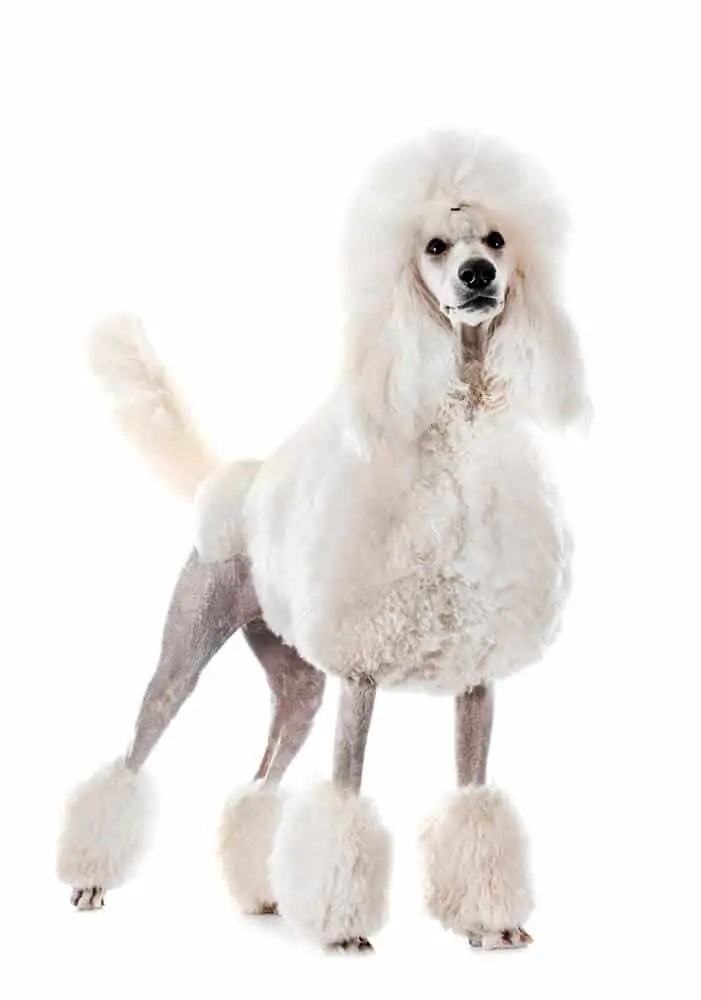
Poodles are known to be one of the smartest dog breeds in the world. Although Poodles are the national dog breed of France, they actually originated from Germany and were originally bred to retrieve ducks, but today, work as search and rescue dogs and guide dogs.
So on top of being smart, they’re also athetlic, agile, and hardworking.
Australian Shepherd
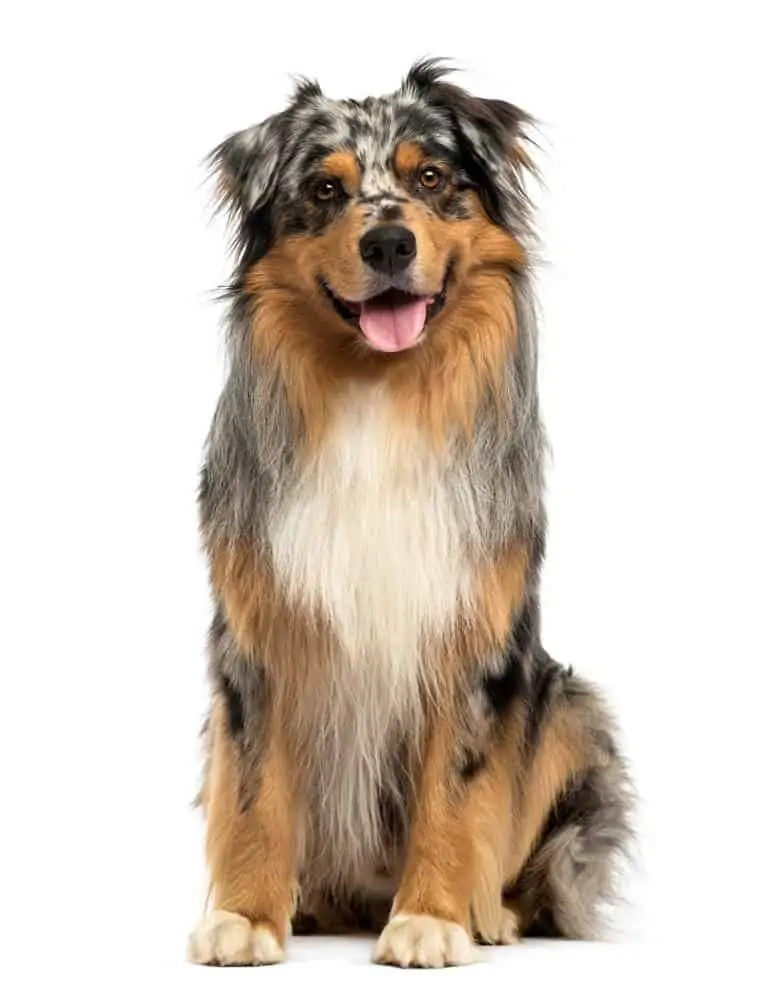
The Australian Shepherd, commonly known as the “Aussie,” is a medium-sized breed of dog that was originally bred to herd livestock.
Aussies are known for their intelligence, high energy levels, and loyalty to their owners.
Like the Poodle, they are often used today as working dogs in a variety of roles, including as search and rescue dogs, therapy dogs, and in agility competitions. They can be highly protective of their owners, and as such, tend to be reactive toward other people and dogs.
Aussiedoodle
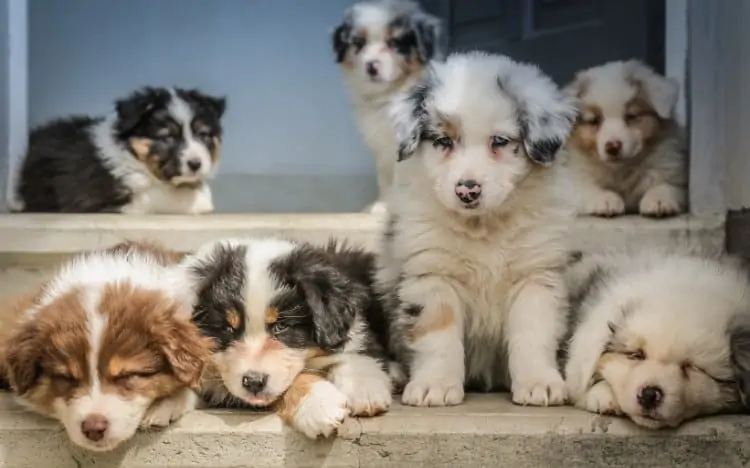
When you combine an Australian Shepherd and a Poodle, you get a brilliant dog. Let’s dive into the unique temperament of the Aussiedoodle.
Playful
Aussiedoodles love to play and when introduced to children and other dogs properly, will want to play all day with them.
Just make sure you supervise children with your dog. Since Australian Shepherds are herding dogs, Aussiedoodles may inherit that instinct and can be known to herd up small children and small animals (similar to the Sheepadoodle).
Energetic
Aussiedoodles are incredibly energetic dogs that require plenty of exercise throughout the day. They love to go on walks, runs, play fetch, go swimming, and take part in agility training.
If you’re an active household, you’ll love having an Aussiedoodle by your side.
However, if you’re looking for a dog with a low energy level, the Aussiedoodle is not the right choice.
Protective
As Australian Shepherds are protective, Aussiedoodles also tend to be incredibly protective of their families. It can take them a long time to warm up to new people or animals and as a result, they can have reactivity issues. If you plan to get an Aussiedoodle, you must be willing to deal with a potentially reactive dog.
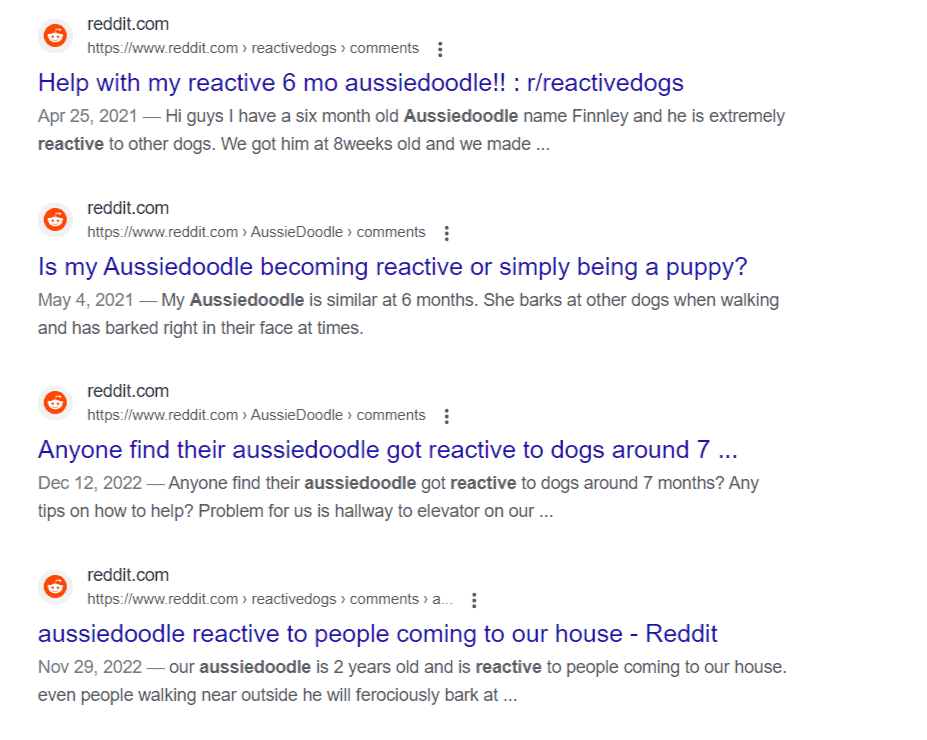
Intelligent
Aussiedoodles pick up commands very fast and are easy to train. They love to follow commands from their owners and are a joy to train.
Being so intelligent, Aussiedoodles can also get extremely bored. Aussiedoodles need plenty of mental enrichment throughout the day like dog puzzles, nose work, and other mentally stimulating games.
Loyal
Aussiedoodles are known as “velcro dogs” who never want to leave your side. They enjoy constant attention and affection, meaning they can be prone to separation anxiety. It’s essential to work with them as a puppy, so they feel confident while alone.
Appearance
Because Aussiedoodles are mixed dogs, each one may look slightly different than the rest! Even pups from the same litter can have different and unique markings.
Most commonly, Aussiedoodles are tall-ish dogs with a slim build, and when you let their hair grow long, they will be fluffy and shaggy looking.
Coats
Australian Shepherds and Poodles have vastly different coat types, so it’s challenging to say what the coat of an Aussiedoodle will be like.
However, in most cases, Aussiedoodles have two coat types: curly (taken after from the Poodle) or wavy (a mix of both the Poodle and the Australian Shepherd).
It’s rare to find an Ausiedoodle with straight fur like the Australian Shepherd, and their coat will likely be a mix between the two parent breeds.
Colors
Given that their parents have many color variations, you can expect Aussiedoodles to also come in various colors.
The Australian Shepherd dogs can be red or red merle, black, blue merle, and can also have white markings and tan points around their body.
Conversely, Poodles come in brown, blue, black, apricot, cream, white, and red.
Like we mentioned earlier, litters of Aussiedoodle puppies will have a range of colors and markings, and your pup may even change colors as they grow into an adult.
Height
Most Aussiedoodles are medium-sized with long legs and a slim and athletic build. In terms of height, Aussiedoodles stand between 15 and 24 inches tall, but again, this depends on the parents!
Weight
Standard Aussie Doodle dogs can weigh anywhere from 40 to 70 pounds, depending on the parents’ weight. Your breeder should be able to give you an estimated size they believe their pups will be based on how big the parents are.
Note: If you want to get a smaller version of the Aussiedoodle, consider a Mini Aussiedoodle, which has a Miniature Poodle parent and weighs 45 pounds or less.
Aussiedoodle generations
As you’re searching for Aussiedoodle breeders, you’ll likely come across terms like F1, F1b, and more. So, what do all these mean?
Let’s get you up to speed. Below is a quick reference to help you understand different Aussiedoodle generations:
- F1 Aussiedoodle dogs (first generation): An Australian Shepherd bred with a Poodle
- F1B Aussiedoodle dogs (first generation backcross): An Aussiedoodle bred with a Poodle
- F2 Aussiedoodle dogs (second generation): Two F1 Aussiedoodles are bred together
- F2B Aussiedoodle dogs (second generation backcross): An F1 and an F1B Aussiedoodle are bred together
If you want to ensure your Aussiedoodle won’t shed, you may want to look at getting an F1B as genetically, they are 75% Poodle, and there’s a greater chance they won’t shed.
Exercise needs
As mentioned earlier, the Aussiedoodle is a highly energetic cross breed.
They require at least 60 to 90 minutes of daily exercise to live a healthy life. Otherwise, you’ll have a bored dog that will become destructive (think chewing up your baseboards, ripping apart your couch, and eating your shoes)!
Some ideas to help you tire out an Aussiedoodle:
- Play fetch in your backyard
- Take them on walks to new places and let them sniff
- Take them to agility classes
- Set up an agility course in your backyard with common household items, like empty boxes, to jump over
- Go swimming
- Play frisbee
- Do daily training
- Play nose work games like find the treat and hide and seek
Training
Aussiedoodles require basic obedience training right from the start. They are brilliant dogs, but that comes with a catch—they may try to outsmart you at some point!
Luckily, since Aussiedoodles are eager to please, they will happily follow along with your training. Just make sure you use positive reinforcement training only. They love praise and treats (food or toys) but will unusually prefer one over the other.
Grooming
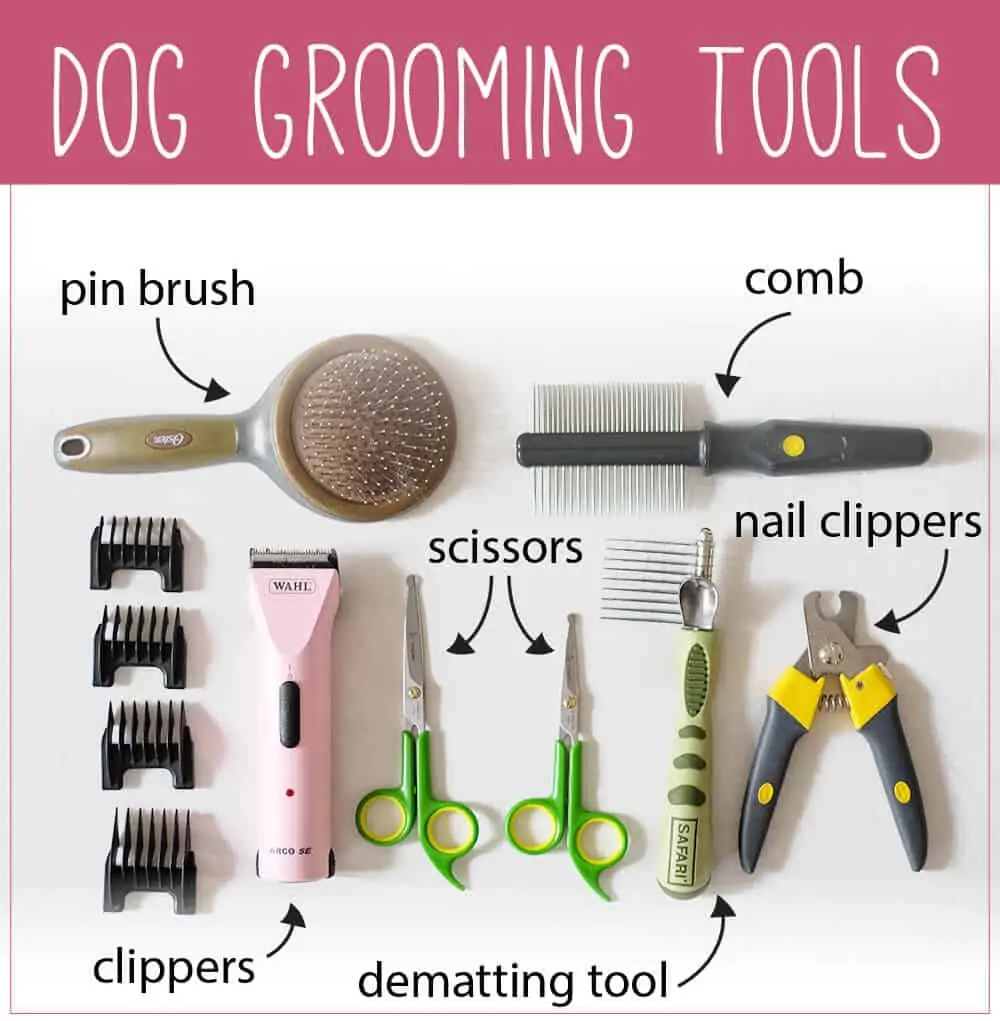
Owning any type of Doodle requires plenty of grooming, and the Aussiedoodle is no exception.
The Aussiedoodle’s coat is most often a mix of their parents and as such, they don’t shed.
Because they don’t shed, you need to spend time combing, brushing, and taking good care of their coats to prevent mats and infections.
On top of daily brushing, you’ll likely want to take them to the professional groomers every six to eight weeks for a bath and a cleanup.
With the right tools and know-how, you can groom your Aussidoodle at home, but this requires lots of patience.
Other essential grooming includes nail clipping, teeth brushing, and ear cleaning.
Health problems
The Aussiedoodle is susceptible to the same conditions and allergies that Poodles and Australian Shepherds face.
Some common serious health issues and problems for Aussiedoodles include:
- Hip dysplasia: A genetic condition where the hip joint does not form properly, leading to pain and mobility issues. Cataracts: A clouding of the lens in the eye that can cause vision problems and even blindness if left untreated.
- Ivermectin sensitivity: A genetic sensitivity to the medication Ivermectin, which is commonly used to treat parasites in dogs and can cause severe reactions in some breeds like the Australian Shepherd.
- Pancreatitis: Inflammation of the pancreas, which can cause vomiting, diarrhea, and abdominal pain.
- Luxating Patella: A condition where the kneecap dislocates from its normal position, causing lameness and discomfort.
- Progressive retinal atrophy: A genetic disease that causes progressive degeneration of the retina, eventually leading to blindness.
- Epilepsy: A neurological disorder that can cause seizures and other symptoms, which may be controlled with medication.
- Cushing’s Disease: An overproduction of cortisol, a hormone produced by the adrenal glands, which can cause a variety of symptoms including increased thirst and urination, hair loss, and a pot-bellied appearance.
The best thing you can do is find reputable breeders who can give you the healthiest dog possible. Breeders should also provide you with health certifications that prove that the puppy and parents have been tested and do not have any diseases that may be passed down to the pup.
Lifespan
Aussiedoodles tend to have a similar lifespan to their parents and live for 10-12 years.
Where to find Aussiedoodle puppies
Breeders
The best way to find this breed is by looking for reputable breeders to ensure you come home with a healthy pup. You should familiarize yourself with the warning signs of a puppy mill to avoid purchasing your dog from unethical breeders.
Here’s what you can look for when trying to find a breeder:
- They will allow you to come visit the puppies.
- They will allow you to meet the parents to see how they behave and interact with their pups.
- They’ll provide you with medical certifications.
- They will ask you questions and screen you as a potential buyer.
Make sure you ask your breeder lots of questions; they are there to help you!
If you feel your breeder is pushing you to put down a deposit, leave. You should also be wary of breeders who claim their dogs are 100% hypoallergenic as no such dog exists.
Rescues
Search through our list of Doodle rescues to see if there are any near you. Alternatively, you can let breeders know to put your name on a list as a potential adopter. Oftentimes, breeders will take back dogs from families who can no longer care for them and will try to find a suitable person to adopt the dog.
While you may not be able to find an Aussiedoodle puppy in a rescue, you’ll likely find adult Aussiedoodles who need loving homes!
Cost
You can expect to pay anywhere from $2,000 to $4,000 for an Aussiedoodle puppy.
On top of the initial cost of Aussiedoodles, the first year can be expensive! There are initial vet visits, grooming, and training needs.
On average, Spruce Pets estimates owning a dog costs $1,500 to $9,900 per year.
Should you get an Aussiedoodle?
Aussiedoodles make great pets! They’re easy to train, lovable, and incredibly energetic making them perfect for active famillies.
But they aren’t for everybody and here’s why:
- Aussiedoodles are expensive: from their initial cost to grooming, Aussiedoodles are expensive.
- Aussiedoodles have high energy: these dogs need lots of daily walks and activities. If you aren’t an active person, you likely want to find a different dog breed.
- Aussiedoodles require lots of at-home-grooming: again, if you don’t think you’ll be up to daily brushing, you may not want to get an Aussiedoodle.
- Aussiedoodles are more likely to be reactive than other types of dogs: You need to be prepared for your Aussiedoodle to be reactive. With the right training (and lots of patients) you can work through their reactivity so you have a confident and happy pooch.
Summary
The Aussiedoodle is a unique and fascinating dog breed that combines the intelligence and loyalty of the Australian Shepherd with the low-shedding qualities of the Poodle.
They are a great choice for active individuals who enjoy spending time outdoors, as Aussiedoodles require plenty of exercise and mental stimulation to stay healthy and happy.
With proper training, they can make excellent companions and even excel in various roles such as search and rescue or therapy work.
However, it’s important to note that Aussiedoodles require a lot of attention and socialization from their owners, so it’s essential to be prepared for the time and commitment needed to properly care for this high-energy breed.
This article may include affiliate links. www.travellingwithadog.com is a participant of Amazon.com Services LLC Associates Program. As an Amazon Associate, I earn a commission from qualifying purchase. www.travellingwithadog.com participates in other affiliate programs, and recieves commissions when purchases are made through the links. The cost is not inflated to account for the commission earned.
Veterinary Disclaimer: travellingwithadog.com is not a substitute for veterinary advice and does not intend to provide any type of veterinary advice for your animals. Please consult your vet for any questions you have regarding your pets health.

About the Author:
Dana owns a Sheepadoodle and a rescue merle Labradoodle. Her first dog growing up was a white Toy Poodle and she’s loved dogs ever since. She has years of experience fostering dogs and has helped find homes for a variety of different breeds, both large and small! After seeing so many dogs end up unwanted and in shelters, she began blogging about different dog breeds (specifically Doodle dogs, since that’s what she knows best) to help people make informed choices when adding a new member to their family.
When Dana’s not brushing her Doodles’ hair (it takes a lot of time for two!) you can find her playing nose work games and fetch with her two amazing pups.
Learn more about her here.

Can’t wait to get my ausie doodle